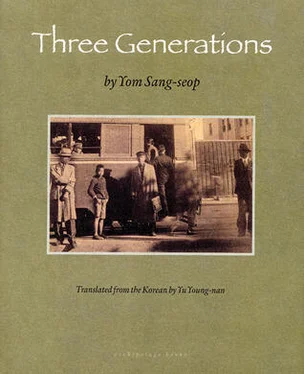His father was just as pitiable. He had been born at the wrong time, in the wrong era. His fate actually had a lot to do with his personality. Perhaps it all began with Deok-gi’s grandfather’s persona. Though Byeong-hwa’s father and Pil-sun’s father both lived in the same era as his own father — in the same environment and under the same conditions — the path of Deok-gi’s father was entirely different from theirs. Ultimately, one’s personality was the deciding factor: not every rich man’s son lived like his father.
Deok-gi sighed at his own fatalism. He wondered what would have happened had the management of his household been entrusted to Byeong-hwa. Byeong-hwa wouldn’t have met Pi-hyeok or opened a grocery, but he would have supported Pil-sun’s family all the same, made sure that Jang Hun always had some pocket money, and set up Gyeong-ae as proprietress of Bacchus. Byeong-hwa wouldn’t have been strangled by household affairs or burdened as keeper of the safe. Deok-gi had no desire to live his father’s life, but it seemed he might be able to relax and enjoy life better, to move about more freely, if he swapped his two thousand bags of rice for his father’s three hundred. To be entrusted with the management of such a big household at such a young age, especially when he had no practical experience beyond his studies, was a staggering onus. Deok-gi was envious of Byeong-hwa, who had created a love nest at the back of a grocery store, and of his father, who had splurged and furnished a house for his concubine. They seemed to be better off than Deok-gi himself, the so-called master of this chaotic household, who had to worry about losing the keys and about even one missing rice bag out of two thousand.
If only my grandfather had lived longer! If only I had an older brother who could take on the household affairs!
Less than a month into his new responsibilities, Deok-gi was already utterly alone and despairing. Above all else, Deok-gi was horrified by the way Pil-sun had been shown the door. Recalling her tearful and enraged expression and his mother’s tirade, he was deeply disturbed.
Deok-gi tried to forget Pil-sun. He took pains to push her to the back of his mind. It frightened him to think of her.
His manipulations and questioning had pushed the young woman’s innocent heart into despair. At the very least, he had made the mistake of upsetting her.
But what could he do now? There didn’t seem to be a solution.
Why are you trying to follow in your father’s footsteps? You’re going to pay for his medicine, you’re going to pay for his hospital fees, and you’re going to pay for everything. His mother’s words cut to the heart of him. Deok-gi was taken aback by the similarities between his father’s situation and his own. He felt as if his life were merely a dark tangle of fateful events.
I can’t turn Pil-sun into another Gyeong-ae, he kept telling himself as he tried to hold back the tears that filled his eyes. He loved Pil-sun too much for that.

Deok-gi grew bored in the main room, so he asked that his bedding be folded up before he went to the outer quarters. Secretary Ji and the older guests had moved to another room, keeping their distance from the new young master. Sitting alone in the large room, he imagined that he would enjoy studying there. He felt ill at ease about sitting in his grandfather’s place; everything in the room reminded him of him. Various relics he had used — the cabinet, the low desk holding the ink stone, the table — might have value as antiques and would be handed down from generation to generation, but they weren’t suitable for him.
Deok-gi was worried that he might have missed the opportunity to take a make-up exam and figured he’d better leave for Kyoto as soon as possible. Realistically, he couldn’t attend Keijo Imperial University while playing the master of his household. He might be able to finish studying in Japan if he delegated the household’s external affairs to Secretary Ji and the manager of the rice refinery, while letting his mother take over internal affairs and money matters. Actually, this arrangement would be good for his mother; her hysteria might subside if she were occupied with the household accounts.
Although Pil-sun wouldn’t accept his help willingly, Deok-gi couldn’t turn a blind eye to her situation, no matter how hard he tried. She stole her way into his heart, unbidden, and he couldn’t help but pity her. He didn’t want to make her his concubine, but again he wondered why they should deceive themselves and conceal their feelings.
A couple of days passed. Deok-gi was thinking of going out for fresh air one afternoon when the phone rang. It was Byeong-hwa. He hadn’t been in touch since he had pressed Deok-gi for the thousand won.
“Won-sam was taken away a while ago. Is everything all right over there?”
“Where was he taken?”
Immediately, Deok-gi remembered the rumor he had heard. Someone must have tipped off the police. Deok-gi knew that nothing would come of it, but it irritated him that his departure for Kyoto would have to be put off once again.
He found it odd that it wasn’t the Jongno Police Station that had taken Won-sam but the Police Division. Byeong-hwa advised Deok-gi to stay put, because it looked like the store was under surveillance; he would keep Deok-gi informed by phone. At dusk, Byeong-hwa called again. Won-sam’s wife had been trailed and had been arrested along with Pil-sun. Gyeong-ae hadn’t come to the store that day; it appeared she had been taken in for questioning as well. Clearly, more was going on than an investigation into Deok-gi’s household.
“Was it the High Police or the Judicial Police? If it’s the High Police, I know someone who can get me information.”
“It’s not clear.”
As he hung up the phone, Deok-gi wondered whether he should go see Kimura, the chief of the High Police. Deok-gi knew Kimura from his Jongno Police Station days. He used to see him from time to time when Deok-gi had acted as his grandfather’s Japanese interpreter; as a wealthy, influential figure, his grandfather had been a representative of an organization of land overseers and a member of a poverty-relief committee.
If word had gotten out that an investigation was in progress because of the rumor concerning his grandfather’s death, Deok-gi would be obliged to see Kimura. It pained him that Pil-sun should suffer in a cold cell. Mulling over the various ways he could help, Deok-gi went to see Byeong-hwa after dinner.

As Deok-gi had surmised, both the Judiciary and High Police were involved.
“It had happened the day before in the late afternoon. High Police Chief Kimura had been smoking near the stove in his office, idly thinking that it was time to go home, when Geumcheon, a section chief, came in and urged him to make a final decision.
“Chief, how about we begin rounding them up this evening?”
“What did the guys say?” Kimura sounded reluctant.
“What do they really know? What matters is that we’re sure, and since we’ve already put our hands on it, we’d better go all the way.”
Section Chief Geumcheon was dissatisfied with the High Police chief’s casual attitude toward the case. It wasn’t that he was unaware of his boss’s reasons; when Kimura was head of the Jongno Police Station, he was rather close to Jo Deok-gi’s grandfather. They couldn’t treat the rich in such a cavalier manner. The chief’s ambivalence made Geumcheon even more eager to take action. Unwilling to soft-pedal his suspicions, he was sure that his hunch was correct.
Читать дальше














